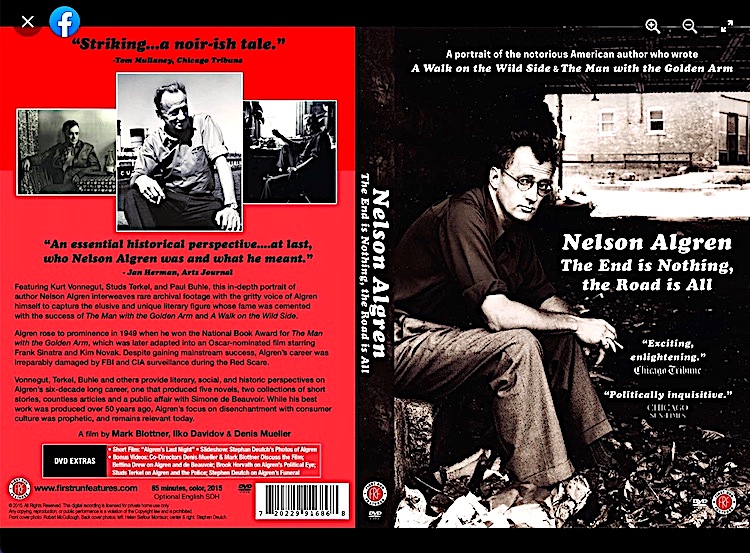Here he is on the big screen at last, an hour and a half of who Nelson Algren was and what he meant. It’s a documentary with the sources — authoritative sources (Kurt Vonnegut and Studs Terkel, for example, who give their personal impressions of the man). Radical sources, too (Paul Buhle for one, who lays out an essential historical perspective). This documentary doesn’t just have the sources, it uses them the way they should be used. Vonnegut, Terkel, Buhle, and the others are allowed to get their say in whole because the filmmakers chose not to produce the cinematic equivalent of a Pop-Tart. They let the story go deep. I’ll have more to say, later, about “The End Is Nothing. The Road Is All.” Meanwhile, this trailer will give you a taste of it. Unfortunately it doesn’t come close to doing the film justice:
Nelson Algren: The End Is Nothing, The Road Is All (the trailer on Vimeo).
This is later: “The End Is Nothing. The Road Is All” takes its title from the epitaph on Algren’s headstone, which comes by way of Algren’s devoted friend and agent, Candida Donadio, who took it from a Willa Cather story. Donadio once told me she’d been saving those words for her own headstone. But when Algren died, she had them chiseled into the headstone she bought for him.
Before anyone gets the idea that I’m dissing the other documentary, “Algren,” which I happen to be included in as one of its talking heads, I stand by what I wrote earlier — that it is “more a fact-filled eulogy than a probing documentary” and that its “seamless editing” is especially superb and that it “floats on a raft of brilliant Algren quotes, all smartly chosen and nicely tied together.”
But I am saying (although comparisons are egregious) that “Road” is more satisfying because while it has all that — the seamless editing, the brilliant quotations, and so on — it tells a more complex tale. Which is crucial. And it’s not merely because of access to different or in some cases better sources (Clancy Sigal, for instance). After all, both flicks include Algren himself, as well as Denise DeClue, Studs Terkel, Stuart Brent, Dave Peltz and others. Both even use some of the same footage from other films. And both have great archival photos. But “Road” uses its sources and footage differently. It’s made by a team of experts, experienced pros, but it’s not slick. It tells Algren’s story in a slower tempo and with greater texture, which is more aborbing. Simply put, “The End Is Nothing. The Road Is All” lives up to its title. It’s in a different league from “Algren.”
The film opened at the American Documentary Film Festival on March 27. It had its Chicago debut earlier this month, on April 4, at the Gene Siskel Theatre. It is produced and directed by Denis Mueller, Ilko Davidov, and Mark Blottner, and is being distributed by First Run Features. A commercial release is expected later this year.
Here are two video excerpts from “Road”:
Here are two more video excerpts:
Postscript: June 6, 2022 — These many years later, I saw this DVD cover art for the first time. — jh


![NELSON ALGREN [foto: Steve Deutch]](http://www.artsjournal.com/herman/wp/wp-content/uploads/2014/06/ALGREN-BACK-PAGE-image-of-NA-e1429470091896.jpg)
![Algren with Amanda Kontowicz. He married her twice. [Archival photo from 'The End Is Nothing. The Road Is All']](http://www.artsjournal.com/herman/wp/wp-content/uploads/2015/04/algren-amanda-260.jpg)
![Kurt Vonnegut [from 'The End Is Nothing. The Road Is All.'] CLICK FOR VIDEO](http://www.artsjournal.com/herman/wp/wp-content/uploads/2015/04/kurt-vonnegut-370-e1429549567984.jpg)
![Studs Terkel [from 'The End Is Nothing. The Road Is All.'] CLICK FOR VIDEO](http://www.artsjournal.com/herman/wp/wp-content/uploads/2015/04/studs-370-e1429549595620.jpg)
![Dave Peltz [from 'The End Is Nothing. The Road Is All.'] CLICK TO WATCH](http://www.artsjournal.com/herman/wp/wp-content/uploads/2015/04/dave-peltz-370-e1429550131327.jpg)
![Steve Deutch [from 'The End Is Nothing. The Road Is All.'] CLICK TO WATCH](http://www.artsjournal.com/herman/wp/wp-content/uploads/2015/04/steve-deutch-370-e1429549783603.jpg)




Bravo to Jan Herman for a precise account of the Algren doc.===which is a deep look at Algren as writer, and victim of the Black List.
I enjoyed this film very much and would like to see it come to DeKalb.